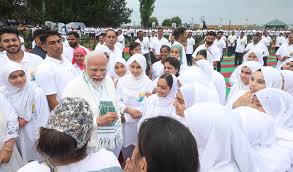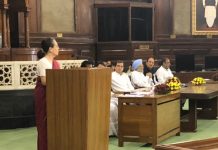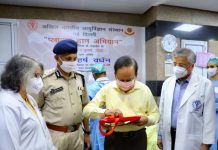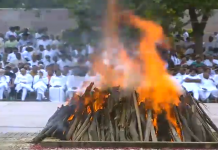During his visit to Srinagar on the occasion of Yoga Day, Prime Minister Modi’s assurance to the people of the Valley regarding Assembly elections has introduced a sense of seriousness about the likelihood of the electoral exercise being held in the near future. A report by Riyaz Wani

Prime Minister Narendra Modi’s visit to Srinagar to lead Yoga Day celebrations on June 21 was unlike his last one to J&K in March which was bereft of any political talk or outreach. Not this one: This time the PM sought to address the long pending demand in the union territory for Assembly elections and the restoration of statehood by assuring that both will take place “soon”.
“The time isn’t far away when, through your votes, you will be able to elect your own government in J&K,” the PM said in Srinagar on June 20. “The day will come very soon when J&K will become a state again for its bright future.”
The visit, Modi’s first since securing a third consecutive term at the Centre, was essentially geared to show off the new-found normalcy in J&K, a region with a complex political and security environment, particularly after the contentious abrogation of Article 370 in August 2019. Ever since, though the UT has come a long way on the road to normalcy, the situation isn’t completely normal. An extended period of calm is occasionally broken by sensational incidents of violence. For example, over the past three years, Jammu division has been a site of some major militant attacks. Rajouri and Poonch, the twin Jammu districts, alone accounted for 53 deaths out of 134 militancy-related killings in 2023, roughly 40 percent of total killings. Of the 53 people killed in the two districts, 19 were Army personnel, including a few officers.
But the BJP is showcasing normalcy in Kashmir Valley as the takeaway from its direct rule of the UT over the last five years. The revocation of Article 370, which granted special status to J&K within the Indian Union, has always been projected by the saffron party as a necessary step for integrating the former state more closely with the rest of India and promoting development in the region. Conversely, critics have raised concerns about the impact on local autonomy and the human rights situation. In this context, Modi’s visit was aimed at addressing both domestic and international audiences, showcasing stability and progress in J&K.
Election promise
The primary goal of Modi’s visit was to set the stage for the upcoming assembly elections, a goal which local people are equally invested in. With an eye on the Hindu majority Jammu division, the BJP aims to leverage its governance decisions over the past five years, particularly the abrogation of Article 370, to secure a strong mandate in the Assembly polls.
However, following the recent militancy-related incidents, which led to the killing of nine pilgrims and a CRPF personnel, the opposition has portrayed the situation in J&K as unstable. The PM’s visit was a bid to project confidence and reassure both locals and people in the rest of the country about the government’s commitment to the region’s development and security. In his speeches in the Valley too, the PM emphasized on development and infrastructure projects, which have been central to the BJP’s narrative in J&K.
One of the key underlying messages of Modi’s visit was the improvement in the security situation in J&K. According to data from the Union Ministry, militancy-related incidents have significantly declined since the reading down of Article 370, with the number of security personnel and militants killed showing a downward trend. This is borne out by data: 80 security personnel lost their lives in 2019, 63 in 2020, 42 in 2021, 32 in 2022 while 30 were killed in 2023. Similarly, 157 militants were killed in 2019, 221 in 2020, 180 in 2021, 187 in 2022 and 73 in 2023. This improvement in security has been a cornerstone of the BJP’s argument for its governance model in the region. Modi’s presence in Srinagar, particularly amid heightened security measures, was designed to symbolize the government’s control and the progress made in curbing terrorism.
While the PM’s visit was also about development and celebrating Yoga, the promise of restoring statehood to J&K is important. The erstwhile state was bifurcated into two Union Territories—Jammu and Kashmir and Ladakh—in 2019. The restoration of statehood has been a persistent demand from various political parties and civil society groups in the region.
The opposition parties in J&K, including the National Conference and the People’s Democratic Party, have criticized the BJP’s approach, arguing that the focus on development projects cannot be a substitute for political engagement and restoration of local autonomy. Former J&K Chief Minister Omar Abdullah has repeatedly called for the restoration of statehood and holding of assembly elections as crucial steps towards normalcy and democracy in the region.
Moot question
The issue now is if the Assembly elections in J&K would now be held along with Maharashtra, Haryana and Jharkhand, and whether statehood would follow soon after as promised by no less than the PM himself. The skepticism on both counts runs deep in the UT, more so in the Valley.
Reacting to the PM’s assurance of an early Assembly election, senior PDP leader Waheed Parra tweeted a cryptic “InshaAllah (God willing)” while juxtaposing the news stories about PM promising Assembly election now and in the early 2019 when Article 370 was yet to be rescinded.
Doubts about elections being held this year have further been aggravated by the recent surge in militant violence in Jammu. Any further escalation in attacks could make the situation more uncertain.
Already, former Army chief, General VP Malik has advocated deferring elections in the UT. In an interview with a private TV news channel, General Malik stressed that delaying the elections by a year was crucial, warning that the situation in Kashmir could escalate if militants achieve some successes in the Jammu region.
“Don’t hasten into holding the elections in J&K by September. Focus on consolidating gains in Kashmir,” he said. “A few terrorist successes in Jammu could incite further terrorism in the Valley. More important than Assembly Elections by September 2024 is ensuring the security of J&K. Postpone the elections by a year.”
However, he was slammed by Omar Abdullah who argued that doing so would be giving in “to extremist forces so that they have a sense of achievement.”
“What’s more surprising is that this has come from an army officer who saw Lok Sabha polls happening in J&K soon after the Kargil War and during the height of militancy in 1999. What a shame!” Abdullah said.
However, the prime minister’s assurance about Assembly elections has introduced an element of seriousness about the likelihood of the exercise being held in near future. And should that happen, the election is likely to be overwhelmingly participated by the people unlike in the past. “J&K’s politics since the abrogation of Article 370 in August 2019 has been in a state of flux, and the restoration of democratic processes through timely elections is crucial for the region’s stability and growth,” an editorial in a local Kashmir daily read.












